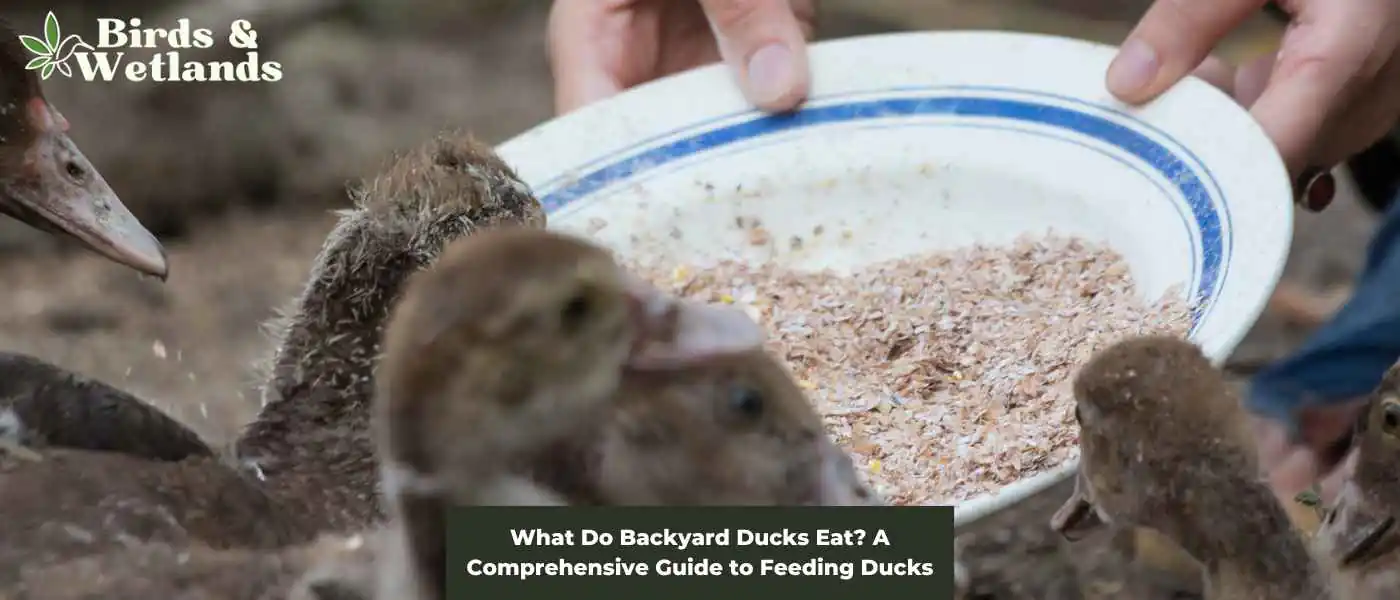Backyard ducks are becoming increasingly popular among homeowners who want to enjoy the benefits of raising their own poultry. However, many people are unsure about what to feed their feathered friends.
So, what do backyard ducks eat?
Backyard ducks require a balanced diet to stay healthy and happy. Their primary food source should be high-quality commercial duck feed in the form of pellets or crumbles, specially formulated to meet their nutritional needs. Supplement their diet with vegetables, grains, and occasional treats like chopped fruits, peas, or corn. Ducks may also forage for insects and small invertebrates in your backyard. Avoid feeding them bread, salty snacks, or processed foods.
Key Takeaways:
Provide high-quality commercial duck feed in the form of pellets or crumbles as their primary food source, ensuring it meets their nutritional needs
Supplement your ducks’ diet with a variety of vegetables, such as lettuce, kale, and peas, as well as grains like oats and rice
Offer occasional treats like chopped fruits, including seedless grapes, apple slices, and berries, but avoid fruit pits and seeds due to toxicity and choking risks
Allow ducks to forage for insects and small invertebrates in your backyard, which can provide additional protein and nutrients
Always provide fresh, clean water for drinking and bathing, as ducks need water to maintain their overall health and well-being
Avoid feeding ducks bread, salty snacks, and processed foods, as these items lack nutritional value and can cause health issues
Feeding Backyard Ducks
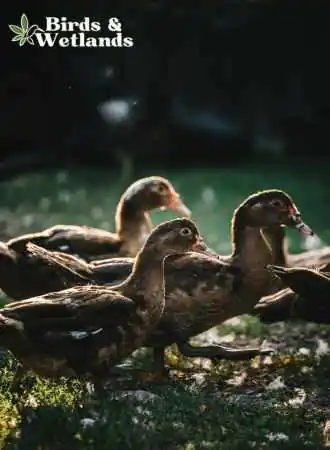
Feeding backyard ducks is an essential part of raising happy, healthy ducks. Wild ducks are omnivores, which means they eat both plants and animals. When you feed ducks, it is crucial you give them a balanced diet for their growth and egg production.
Duck Dietary Requirements
It’s important to understand their dietary requirements:
| Nutritional Needs | Daily Requirement | Purpose | Food Sources |
|---|---|---|---|
| Protein | 16% of diet | Muscle growth and maintenance | Mealworms, crickets, soybeans, peas, fishmeal, dairy products |
| Energy | 1,300 calories (for adult layers) | Fuel for bodily functions | Corn, wheat, barley, oats, sunflower seeds |
| Amino Acids | Lysine: 0.75% | Protein synthesis | Soybeans, fishmeal, dairy products |
| Arginine: 0.85% | Protein synthesis and immune function | Soybeans, peanuts, fishmeal, meat and bone meal | |
| Methionine & Cystine: 0.65% (combined) | Feather growth and maintenance | Sesame seeds, fishmeal, sunflower seeds | |
| Linoleic Acid: 1% | Healthy skin and feathers | Corn, soybean oil, canola oil, flaxseed | |
| Calcium | Layer ducks: 2.9% | Eggshell formation and muscle function | Oyster shells, limestone, eggshells, bone meal |
| Non-layers: 0.7% | Bone growth and maintenance | Same as above, but at lower concentrations | |
| Phosphorus | 0.35% | Bone and muscle function | Meat and bone meal, fishmeal, soybean meal |
| Vitamins and Minerals | Purpose | Food Sources |
|---|---|---|
| Potassium | Nerve and muscle function | Bananas, leafy greens, potatoes |
| Sodium | Nerve and muscle function | Table salt, baking soda |
| Chlorine | Digestive and immune function | Table salt, seaweed |
| Magnesium | Muscle and bone function | Leafy greens, nuts, whole grains |
| Manganese | Bone and cartilage formation | Whole grains, nuts, legumes |
| Zinc | Immune function and feather growth | Oysters, crab, pumpkin seeds |
| Iron | Oxygen transport and muscle function | Liver, beef, spinach |
| Copper | Pigment formation and bone health | Shellfish, liver, nuts |
| Iodine | Thyroid function | Seafood, iodized salt |
| Cobalt | Vitamin B12 synthesis | Liver, kidney, clams |
| Selenium | Antioxidant function and immune system | Brazil nuts, whole grains |
| Vitamin A | Vision and immune function | Carrots, sweet potatoes, liver |
| Vitamin D3 | Calcium absorption and bone health | Sunlight, fish liver oil |
| Vitamin E | Antioxidant function and immune system | Leafy greens, nuts, seeds |
| Riboflavin | Metabolism and growth | Liver, eggs, milk |
| D-Pantothenic acid | Metabolism and growth | Liver, whole grains |
| Niacin* | Metabolism and growth | Liver, poultry, fish, peanuts |
| Choline | Nervous system and liver function | Eggs, liver, soybeans |
| Biotin | Metabolism and growth | Liver, egg yolks, nuts, seeds |
| Folic Acid | Cell growth and development | Leafy greens, liver, legumes |
| Thiamin | Metabolism and growth | Liver, pork, legumes |
| Pyridoxine | Protein synthesis and immune function | Liver, fish, whole grains |
| Ethoxyquin | Preservative | Commercial duck feed |
The Best Food to Feed Backyard ducks
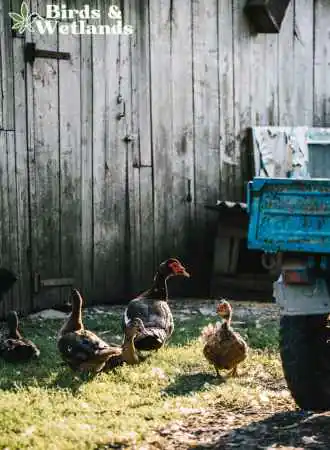
Commercial duck feeds are specifically formulated to meet the nutritional requirements of ducks at different stages of their lives. These feeds come in three main types: starter feed, grower feed, and layer feed and aim to mimic the diet of wild birds as closely as possible.
Starter Feed
Starter feeds are designed for ducklings from hatching until they are about three weeks old. These feeds contain a high protein content (18-20%) to support rapid growth and development during this critical period. The pellets are usually small, about 1/8 inch in size, making them easy for ducklings to consume.
Grower Feed
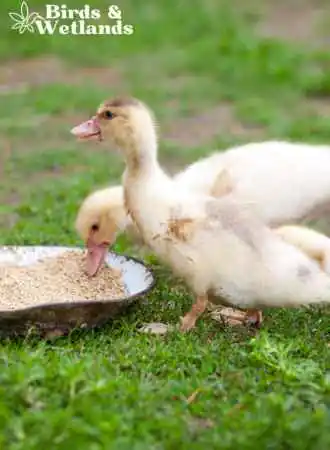
Grower feeds are formulated for ducks from four to thirteen weeks of age. These feeds have slightly lower protein content (16-18%) compared to starter feeds, providing the right balance of nutrients for steady growth during this stage. Grower feeds also contain essential vitamins and minerals to support the development of strong bones and a healthy immune system.
Best Duck Feed Pellets
Are you a duck owner looking for the perfect feed to keep your feathered friends happy and healthy? Look no further than Purina Duck Feed Pellets! With their nutritionally balanced formula and high-quality ingredients, these pellets are the ultimate solution for providing your ducks with the nutrition they need to thrive.
Pros
- Complete Nutrition: Purina Duck Feed Pellets are nutritionally balanced to provide all the essential vitamins and minerals that ducks need to stay healthy and strong.
- Easy to Digest: The pellets are specially formulated to be easy to digest, which makes them ideal for ducks of all ages.
- Promotes Growth and Development: With its balanced nutrition formula, Purina Duck Feed Pellets are designed to support healthy growth and development in ducks.
- Suitable for All Breeds: Whether you have domestic ducks or wild ducks, Purina Duck Feed Pellets are suitable for all breeds of ducks.
- Trusted Quality: Purina has been producing high-quality animal feed for over 100 years, so you can trust that your ducks are getting the best possible nutrition with Purina Duck Feed Pellets.
Cons
- Cost: Compared to other types of duck feed on the market, Purina Duck Feed Pellets can be slightly more expensive. However, many customers feel that the high-quality ingredients and balanced nutrition formula are worth the extra investment.
- Pellet Size: Some customers have noted that the pellet size of Purina Duck Feed Pellets can be quite large, which may not be suitable for smaller or younger ducks. However, many customers have reported that the pellets can easily be broken up or soaked in water to make them easier to eat.
Layer Feed
Layer feeds are meant for laying ducks, typically around 14 weeks of age and older. These feeds have a protein content of 16-18% and are enriched with calcium to ensure strong eggshells and proper muscle function. Providing layer feed to laying ducks helps support optimal egg production and overall health.
Chicken Feed as an Alternative
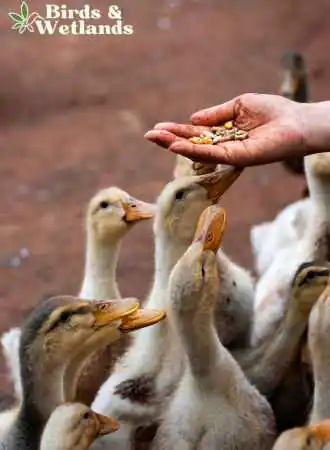
In some cases, chicken feed can be used as an alternative to duck feed, provided it is non-medicated. However, ducks have slightly different nutritional requirements than chickens, so it is essential to supplement their diet with additional nutrients, such as niacin, to prevent deficiencies.
When using chicken feed or chicken layer feed for ducks, it is recommended to choose a feed with a similar protein content to the appropriate duck feed type (starter, grower, or layer) and provide the necessary supplements.
Grit for Digestion
Ducks, like other poultry, have a specialized digestive system that requires grit to break down food properly. Grit consists of small rocks or crushed shells that ducks store in their gizzards. As food passes through the gizzard, the grit grinds the food into smaller particles, making it easier for the duck to digest and absorb nutrients.
Providing grit for your ducks is essential for their digestive health. You can offer grit separately in a small dish or mix it with their feed. Be sure to use an appropriate size of grit for the age of your ducks, as larger grit may be too difficult for young ducklings to swallow.
Manna Pro Poultry Grit
Maximize Your Ducks’ Health with Manna Pro Poultry GritThe Ultimate Digestion Aid
Discover the key to healthy, happy ducks with Manna Pro Poultry Grit – a product designed to enhance digestion and support your ducks’ overall well-being.

Pros
- Improved digestion: Manna Pro Poultry Grit helps ducks break down their food, promoting efficient nutrient absorption.
- Versatility: Not just for ducks, this poultry grit also serves as a useful amendment for potting soil in cactus and succulent gardens.
- Quick shipping: Customers appreciate the prompt delivery of Manna Pro Poultry Grit, ensuring their ducks get the grit they need as soon as possible.
- Larger grit pieces: The slightly larger grit pieces are still effective in aiding digestion and may provide a more efficient grinding action in the gizzard.
- Trusted by duck owners: Manna Pro Poultry Grit has received numerous positive reviews, making it a reliable and popular choice among duck owners.
Cons
- Not widely available in local stores
Other Foods for Your Pet Ducks
Meal Worms
Mealworms are a healthy treat for ducks. They are high in protein and easy to digest. Mealworms can be purchased at pet stores or online. Offer mealworms in moderation, as too much protein can lead to health problems.
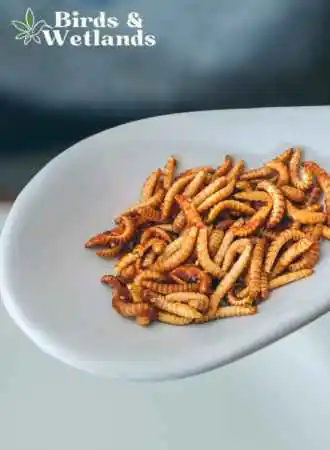
Leafy Greens
Leafy greens like spinach, kale, and lettuce are an excellent source of vitamins and minerals for ducks. They also provide roughage, which helps with digestion. Offer a variety of leafy greens to your ducks to ensure a varied diet.
Fish Eggs
Fish eggs are a nutritious treat for ducks. They are high in protein and omega-3 fatty acids. However, fish eggs should be fed in moderation, as they are high in cholesterol.
Scrambled Eggs
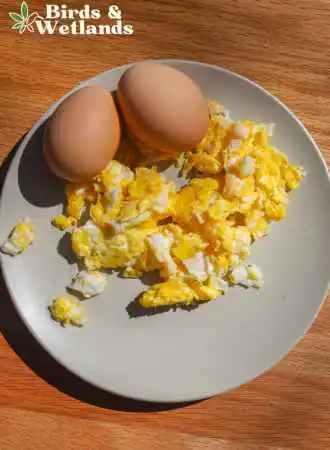
Scrambled eggs are a great source of protein for ducks. They can be fed to ducks of all ages. Scrambled eggs should be cooked without salt or seasonings.
Sweet Potatoes
Sweet potatoes are a healthy treat for ducks. They are high in fiber and vitamin A. Sweet potatoes should be cooked and mashed before feeding to ducks.
Fresh Grass
Fresh grass is an essential part of a duck’s diet. Ducks love to graze on grass, and it provides them with necessary nutrients like vitamin K. Ensure that the grass is free from pesticides and other harmful chemicals.
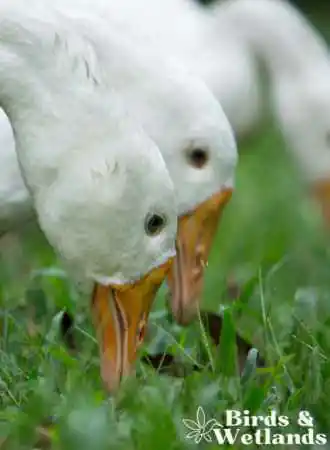
Rolled Oats
Rolled oats are a healthy treat for ducks. They are high in fiber and protein. Rolled oats can be fed to ducks of all ages.
Sunflower Seeds
Sunflower seeds are a healthy treat for ducks. They are high in fat and protein. Sunflower seeds should be fed in moderation, as too much fat can lead to health problems.
Feeding backyard ducks a varied diet is essential for their health and egg production. A balanced diet should include starter feed, layer feed, duck feed, mealworms, leafy greens, fish eggs, scrambled eggs, sweet potatoes, fresh grass, rolled oats, and sunflower seeds when you are raise ducks. Ensure that ducks have access to fresh water and oyster shells for calcium absorption.
Weekly Meal Plan
Here is a sample meal plan which gives the ducks a wide variety and meets all their dietary requirements:
Day 1:
- Morning: 1 cup of commercial poultry feed (16% protein) and 1/2 cup of cracked corn
- Afternoon: Fresh kale or spinach leaves (rich in vitamins and minerals)
- Evening: 1/2 cup of soybeans (rich in lysine and other amino acids)
Day 2:
- Morning: 1 cup of commercial poultry feed (16% protein) and 1/2 cup of wheat berries (rich in energy)
- Afternoon: Fresh blueberries or raspberries (rich in antioxidants)
- Evening: 1/2 cup of sesame seeds (rich in methionine and cystine)
Day 3:
- Morning: 1 cup of commercial poultry feed (16% protein) and 1/2 cup of sunflower seeds (rich in linoleic acid)
- Afternoon: Fresh chopped carrots or sweet potatoes (rich in vitamin A)
- Evening: 1/2 cup of oyster shells (rich in calcium)
Day 4:
- Morning: 1 cup of commercial poultry feed (16% protein) and 1/2 cup of soybean oil (rich in fat)
- Afternoon: Fresh chopped cucumbers or zucchini (high in water content)
- Evening: 1/2 cup of crickets or mealworms (rich in protein)
Day 5:
- Morning: 1 cup of commercial poultry feed (16% protein) and 1/2 cup of peas (rich in protein)
- Afternoon: Fresh chopped apples or pears (rich in vitamins and minerals)
- Evening: 1/2 cup of fishmeal (rich in lysine and other amino acids)
Day 6:
- Morning: 1 cup of commercial poultry feed (16% protein) and 1/2 cup of oats (rich in energy)
- Afternoon: Fresh chopped lettuce or cabbage (high in water content)
- Evening: 1/2 cup of pumpkin seeds (rich in zinc)
Day 7:
- Morning: 1 cup of commercial poultry feed (16% protein) and 1/2 cup of barley (rich in energy)
- Afternoon: Fresh chopped beets or radishes (rich in minerals)
- Evening: 1/2 cup of eggshells (rich in calcium)
Best Overall Duck Feeder -FeatherEase Automatic Chicken Waterer & Feeder
Simplify Your Poultry Care with One Smart Solution!
Enhance your poultry care with the FeatherEase Automatic Chicken Waterer & Feeder, a convenient and efficient solution designed to keep your ducks and chickens well-fed and hydrated.

Pros
- Simplify your poultry care routine: Dual-function design combines an automatic waterer and feeder in one convenient unit.
- Save time and effort: Large feeder and waterer capacities reduce the need for frequent refill.
- Save money: Innovative no-waste feeding system minimizes feed spillage and waste.
- Long lasting: Food-grade, BPA-free materials ensure the safety and health of your poultry, while the durable constructio.
- Easy-to-assemble and maintain design simplifies the process of keeping your poultry hydrated and well-fed.
Cons
- Users with hard water may experience difficulty in separating the inner cup from the main cup of the waterer due to mineral buildup.
- The feeder’s holes may be too large for some users, allowing chickens to scatter food out, which could result in waste.
- The waterer may not function effectively in colder climates, requiring alternative solutions during the winter months.
Food for Adult Ducks vs Baby Ducks
When it comes to feeding ducks, it is essential to understand the different nutritional requirements for adult ducks and baby ducks. Providing the appropriate diet for each stage of a duck’s life ensures optimal growth, health, and, in the case of laying ducks, egg production.
Baby Ducks
Baby ducks, or ducklings, have unique dietary needs compared to adult ducks. They require a high protein diet to support their rapid growth and development during the first few weeks of life. Ducklings eat a specially formulated starter feed, containing 18-20% protein, is recommended for ducklings from hatching until they are about three weeks old.
The small size of starter feed pellets (about 1/8 inch) makes them easier for ducklings to eat. Additionally, ducklings require more niacin than adult ducks to support their growth and prevent nutritional deficiencies. Niacin can be supplemented through the addition of brewer’s yeast to their feed and is essential when raising ducks.
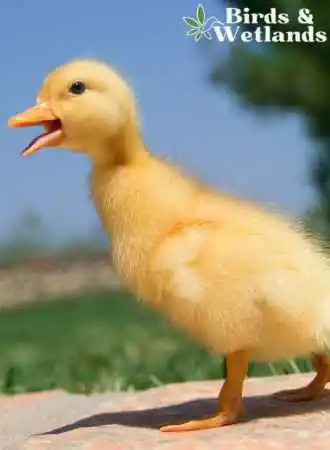
Adult Ducks
As ducks mature, their nutritional requirements change. Adult ducks require a lower protein content in their diet compared to ducklings, typically around 16-18% protein. Grower feeds are designed for ducks from four to thirteen weeks of age, while layer feeds are suitable for laying ducks 14 weeks and older.
Layer feeds are enriched with calcium to support strong eggshells and proper muscle function. Adult ducks also benefit from a diverse diet that includes vegetables, grains, and occasional treats such as fruits and insects. However, it is essential to avoid overfeeding adult ducks, as excess food can lead to obesity and related health issues.
Dietary Requirements of a Female Duck
Female ducks, also known as hens, have specific dietary needs depending on their purpose, such as egg-laying or meat production. If a female duck is being raised for egg production, it is crucial to provide her with a diet that meets her nutritional requirements to ensure she remains healthy and produces a consistent supply of eggs.
Layer Feed for Egg-Laying Ducks
For egg-laying ducks, a layer feed specifically formulated for ducks is recommended. Layer feed typically contains around 16-18% protein, with added calcium to support strong eggshells and proper muscle function.
The calcium content in layer feeds is essential for female ducks, as a calcium deficiency can lead to soft-shelled or misshapen eggs and put the duck at risk of developing egg-binding or other reproductive issues.
Diverse Diet for Optimal Health
In addition to layer feed, it is beneficial to provide female ducks with a diverse diet that includes vegetables, grains, and occasional treats such as fruits and insects. A varied diet can help maintain optimal health and prevent nutritional deficiencies. However, it is essential to avoid overfeeding, as excess food can lead to obesity and related health issues.
Access to Fresh Water
Female ducks also need constant access to clean, fresh water. Adequate water intake is crucial for proper digestion and hydration, as well as for flushing out excess calcium from their system. Water is also necessary for female ducks to clean their reproductive systems and prevent infection.
Free Range Ducks
Free-range ducks are those that have access to outdoor spaces where they can forage for food, exercise, and engage in natural behaviors. Providing a free-range environment for your ducks comes with numerous benefits, including improved health, better-quality eggs, and a more natural lifestyle.
Diet of Free-Range Ducks
Free-range ducks will naturally forage for insects, small fish, aquatic plants, seeds, and other food sources found in their environment. This natural diet contributes to their overall health and well-being, as it provides a diverse range of nutrients. However, it is essential to ensure that free-range ducks also have access to a balanced commercial feed to meet their nutritional needs.
Supplementing Free-Range Ducks’ Diet
While foraging provides free-range ducks with many nutrients, it may not be a complete and balanced diet, depending on the plants and food sources available.
To ensure your ducks receive a well-rounded diet, provide them with a balanced commercial feed that is appropriate for their age and purpose (e.g., starter feed for ducklings, layer feed for egg-laying ducks). This will ensure that they receive the necessary protein, vitamins, and minerals for optimal growth and health.
Grit for Free-Range Ducks
Free-range ducks will naturally pick up grit from their environment, which aids in digestion. However, it is still a good idea to provide them with additional grit, especially if they spend time on surfaces where grit is scarce. Grit helps ducks break down and digest their food more efficiently.
Access to Fresh Water
Even when ducks are free-ranging, it is vital to provide them with constant access to clean, fresh water. Ducks need water not only for drinking but also for bathing and cleaning themselves. Maintaining proper hygiene is essential for their overall health and preventing diseases.
Best Waterfowl Feed
Delightful Feeding Experience
Transform your backyard into a scenic waterfowl habitat and enjoy an interactive feeding experience with Natural Waterscapes Waterfowl Floating Food.

Pros
- Nutritious Food: Natural Waterscapes Waterfowl Floating Food is specifically designed to provide essential nutrients to waterfowl, including swans, geese, and ducks, helping them maintain a healthy diet.
- Convenient: The food comes in resealable packaging, making it easy to store and use as needed. It is also easy to handle and transport.
- Floating Formula: The floating formula of the food allows it to remain on the surface of the water, making it easier for waterfowl to eat and minimizing the risk of water contamination.
- Attracts Waterfowl: The food is formulated to attract various waterfowl species, including swans, geese, and ducks, to your pond, lake, or other water body, providing an opportunity to observe and enjoy these beautiful creatures.
- Environmentally Friendly: Natural Waterscapes Waterfowl Floating Food is made with environmentally friendly ingredients and does not contain any harmful preservatives, making it safe for both waterfowl and the environment.
Cons
- Shelf Life: The food’s shelf life may be limited compared to other types of waterfowl food due to its natural ingredients and lack of preservatives. This means you may need to use it up quickly after opening the package to prevent it from going bad.
Mixed Flock – Difference between a duck diet and a chicken diet?
While both domestic ducks and chickens are poultry, there are some differences in their nutritional needs and dietary requirements. Here are a few key differences between duck and chicken diets:
Protein Requirements: Ducks require a higher percentage of protein in their diet than chickens do. While chickens generally require around 15-20% protein in their diet, ducks need closer to 16-20% protein to support their muscle growth and maintenance.
Calcium Requirements: Both ducks and chickens require calcium for strong bones and eggshell formation. However, ducks typically require more calcium than chickens do, especially if they are laying eggs. Layer ducks need around 2.9% calcium in their diet, while non-layers only need about 0.7%. Chickens, on the other hand, usually need between 2.5-4% calcium, depending on their age and whether they are laying eggs.
Fat Content: Ducks require a higher fat content in their diet than chickens do, especially during the winter months when they need extra energy to stay warm. Adding a source of fat, such as vegetable oil or sunflower seeds, to a duck’s diet can help meet this requirement.
Food Texture: Chickens are omnivorous and typically eat a mix of grains, seeds, and insects, while ducks are more adaptable and can consume a wider variety of foods. Ducks also prefer wetter foods and are able to digest and extract nutrients from them more efficiently than chickens.
Generally chick feed or a poultry feed will give ducks most of their nutritional requirements but they can be topped up. Just ensure that the chick feed is not a medicated feed as this will cause issues.
Healthy Treats for your Feathered Friends
Ducks enjoy a variety of treats that not only provide enjoyment but also contribute to their overall health and well-being. Here are some healthy options you can offer your ducks as occasional treats:
- Leafy Greens: Ducks love leafy greens such as kale, lettuce, Swiss chard, and spinach. These nutrient-dense vegetables provide essential vitamins and minerals to support their health. Make sure to chop the greens into small, manageable pieces before feeding them to your ducks.
- Fruits: Many ducks enjoy fruits such as apples, berries, grapes, and melons. Fruits provide natural sugars and essential vitamins, making them a healthy treat option. Be sure to remove any seeds or pits, and cut the fruits into small pieces to prevent choking.
- Vegetables: Ducks can also benefit from a variety of vegetables, including peas, corn, carrots, and cucumbers. These vegetables provide essential nutrients and help to diversify their diet. Ensure that the vegetables are chopped into small pieces for easy consumption.
- Grains: Whole grains like oats, barley, and quinoa can be a nutritious treat for ducks. They are rich in fiber and complex carbohydrates, providing a slow-release energy source. Cooked grains are easier for ducks to digest, so consider boiling or steaming them before feeding.
- Live insects: Ducks enjoy catching and eating live insects such as mealworms, crickets, and earthworms. Insects provide a natural source of protein and help satisfy their instinctual foraging behaviors. You can purchase live insects from pet stores or online suppliers.
- Cooked eggs: Surprisingly, ducks can benefit from eating cooked eggs, as they are an excellent source of protein and essential nutrients. Make sure to cook the eggs thoroughly and chop them into small pieces before offering them to your ducks.
What Not to Feed Your Ducks
Ducks are opportunistic eaters and will eat almost anything they come across. However, not all foods are suitable for their diet and some can even be harmful to their health. It is important to avoid feeding them certain foods to ensure their well-being.
Foods to Avoid
Junk Food and Processed Foods
Feeding ducks junk food and processed foods can lead to obesity, malnutrition, and other health problems. These foods are high in fat, sugar, and salt, which can cause weight gain and other health issues and offer very little nutritional value. It is best to avoid feeding your ducks these types of foods altogether.
Moldy Food
Moldy food can be toxic to ducks and can cause digestive problems, liver damage, and even death. It is important to avoid feeding your ducks any food that has gone bad or has mold on it.
Cracked Corn
While cracked corn is a popular food for ducks, it is not a healthy option. It lacks the necessary nutrients and vitamins that ducks need to maintain their health. It can also cause weight gain and other health problems if fed in excess.
Small Fish
While ducks love to eat small fish, it is important to avoid feeding them too much. Small fish can contain high levels of mercury, which can be harmful to their health if consumed in large quantities.
Unwanted Pests
Feeding ducks can attract unwanted pests such as rats, mice, and other rodents. These pests can carry diseases that can be harmful to both ducks and humans. It is important to keep the feeding area clean and avoid leaving food out for extended periods of time to prevent attracting these pests.
It is important to be mindful of what you feed your ducks to ensure their well-being. Avoid feeding them junk food, moldy food, cracked corn, and too many small fish. By providing them with a healthy and balanced diet, you can help ensure their health and happiness.
Maintaining a Healthy Diet for Ducks
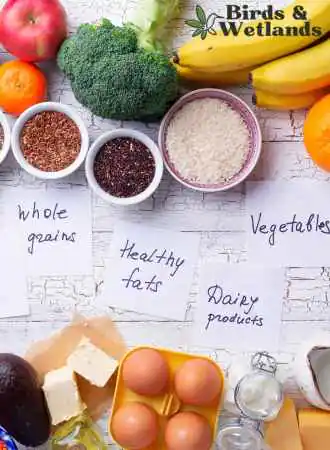
Ducks require a balanced diet to maintain good health, proper growth, and egg production. A balanced diet for ducks should include a variety of nutrients, including protein, energy, amino acids, and antioxidants. Ducks also require calcium for strong eggshells and healthy bones.
Balanced Diet
A balanced diet for ducks should include a mix of commercial feed, fresh fruits and vegetables, and grains. Commercial feed should be formulated for ducks and contain the necessary nutrients for healthy growth and egg production. Ducks can also be offered chick starter feed in early spring to provide an extra boost of nutrition.
Fresh fruits and vegetables can be offered to ducks as a treat and to provide additional vitamins and minerals. Ducks enjoy a variety of fruits and vegetables, including lettuce, spinach, kale, peas, and berries.
Grains, such as corn and wheat, can be offered to ducks as a supplement to their diet. However, grains should not make up the majority of their diet as they are low in protein and other important nutrients.
Calcium Absorption
Calcium is an essential nutrient for ducks, especially for laying hens. Ducks require a high level of calcium to produce strong eggshells and maintain healthy bones. To ensure proper calcium absorption, ducks should be offered free-choice oyster shell or crushed eggshells. This will allow each duck to eat what they need for strong eggshells.
Nutritional Deficiencies
Nutritional deficiencies can occur in ducks if they are not provided with a balanced diet. Angel wing is a common nutritional deficiency in ducks that occurs when there is an imbalance of protein and energy in their diet. To prevent this, ducks should be fed a diet that contains 16% protein and 1,300 calories per day for adult layers.
Ducks can also develop other nutritional deficiencies if they are not provided with a balanced diet. It is important to monitor their diet and ensure they are receiving the necessary nutrients for good health.
Maintaining a healthy diet for ducks is essential for their overall health and well-being. A balanced diet that includes commercial feed, fresh fruits and vegetables, and grains is necessary for proper growth and egg production. Ducks also require calcium for strong eggshells and healthy bones. By providing a balanced diet and monitoring their nutritional intake, ducks can remain healthy and happy.
FAQS on What to Feed Backyard Ducks
What can I feed my backyard duck?
Backyard ducks can be fed a variety of foods, including commercial duck feed such as starter, grower, or layer feed, depending on their age and purpose. You can also provide them with chicken feed, grit for digestion, and occasional healthy treats like leafy greens, fruits, vegetables, whole grains, live insects, and cooked eggs.
What should you not feed ducks?
Avoid feeding ducks bread, junk food, salty snacks, and foods high in sugar. These types of foods can lead to health problems, obesity, and malnutrition. Also, do not feed them moldy food, as it can contain harmful toxins. Stick to a balanced diet that meets their nutritional needs.
Is it OK to feed ducks in my yard?
Yes, it is generally fine to feed ducks in your yard as long as you provide them with a proper diet and clean, fresh water. Feeding ducks can help supplement their diet, especially during times when natural food sources may be scarce. However, be cautious not to overfeed them, as this can lead to health problems and disrupt the balance of their natural diet.
What is a domestic duck’s favorite food?
Domestic ducks enjoy a variety of foods, but some favorites include leafy greens, fruits, vegetables, and insects. Offering a balanced diet that includes their favorite foods can keep them healthy and happy.
What is the best food to feed pet ducks?
The best food for pet ducks is a commercial duck feed formulated specifically for their age and purpose, such as starter, grower, or layer feed. This ensures they receive the proper balance of nutrients required for optimal health. Additionally, you can supplement their diet with healthy treats like leafy greens, fruits, vegetables, and insects.
Should I feed wild ducks in my yard?
Feeding wild ducks in your yard can be a rewarding experience, but it’s important to be mindful of their nutritional needs. Offer them appropriate foods like leafy greens, vegetables, fruits, and grains, and avoid giving them bread or junk food. Feeding wild ducks responsibly can help support their health and well-being without causing harm to their natural diet and environment.

